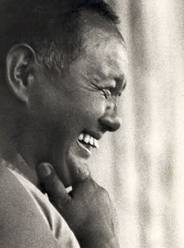
Lama Thubten Yeshe: If you understand your own attitude and level and know what you need at any particular moment in time.
Lama Yeshe: True Dharma Practitioners Welcome Trouble
Sometimes when people first hear Dharma teachings on happiness and suffering they think that happiness depends upon suffering and that if they were to be completely free of suffering there would be no way to experience happiness. I can see where the idea comes from. In a way it’s quite logical: if there’s no misery there’s no happiness; misery and happiness are interdependent phenomena. This is human experience. It’s my experience too.
When I was studying at Sera in Tibet from the ages of nine to twenty-four, I took many teachings and received many commentaries from excellent teachers. I was well looked after by my uncle, who made sure I never went hungry or thirsty and took care of me in general. It was a typical monastic life and it was really good. And from my side I tried my best to study and practice Dharma.
But still, in 1959, the Chinese kicked us out. Well, not exactly, but they did not allow people to practice Dharma, so I thought that if I want to keep practicing there was no reason to stay in Tibet. So I escaped to India. Not only were the Chinese preventing us from practicing, they were shooting people dead and even though I had been studying and practicing, I didn’t feel ready to die.
So in that painful situation of uncertainty I had to look deeply into myself to see if all those teachings I had taken would allow me to cope with my new reality. I found that they helped a great deal, and that gave me the confidence I needed to deal with the changing environment in which we found ourselves.
If you’re not tested, you take teaching after teaching and think you’re OK, but when you’re confronted with a difficult situation, it’s possible that you’ll find you’re not OK at all. So that’s why true Dharma practitioners welcome trouble. It gives them a chance to see if what they’ve been studying works or not, a chance to transform suffering into happiness. Otherwise you just go blithely along, completely out of touch with reality, thinking you’re OK when you’re not, because you haven’t actually been practicing Dharma at all.
To put this another way, painful situations are a source of wisdom. How so? First of all, painful situations arise as a result of nonvirtuous karma. When we experience pain we should ask why is this happening to me? How has this come about? That sort of inquiry leads us to understand that it’s the ripening of negative karma we created in the past. That basic understanding can grow into wisdom; the painful experience helps us develop a deeper understanding that is beyond the merely intellectual.
Of course, if you’re completely ignorant, it doesn’t matter how much suffering you experience, there’s no way for that to lead to happiness. All you do is go from misery to more misery. If, on the other hand, you have at least a modicum of Dharma wisdom, when you’re in difficulty you know how to use that experience to lead yourself into happiness.
One lama said, “When things go well, you’re a great Dharma practitioner; when things go badly, your Dharma disappears. When your stomach is full and sunshine is pouring into your room, it’s easy to look religious; but when difficulties arise, you come up empty.”
It’s like when I was a young boy in Tibet and everything was going well, I pretty much took it for granted that I was practicing Dharma. It could easily have happened that when it came to the crunch, I could have found my Dharma practice wanting–that I’d never practiced or even understood Dharma–and that could easily have led me to give it up, thinking that Dharma doesn’t work.
Dharma practice is very difficult if you don’t understand what it is. You need to realize that Dharma teachings are talking about you, your personal reality. You need to take them personally and integrate them with your life. It’s no good if your Dharma understanding is like soup–many different ideas all mixed up–and you never make Dharma a part of your life. Then it can’t really help you.
If you understand your own attitude and level and know what you need at any particular moment in time, you can fulfill your needs appropriately and will see yourself making real progress. Simply collecting information that’s disconnected from your own reality doesn’t make sense. By understanding Dharma from your own point of view, from the way you live your life, you have a much better chance of developing yourself. So that’s what you should try to do. Base your practice on your own experience.
Lama Yeshe gave this teaching at Grizzly Lodge, California, in 1980. Edited by Nicholas Ribush.